IN FOCUS: Disability sport and the push for excellence and equality in Singapore
A strong performance by Team SG's athletes at the Paralympics has reignited the conversation on disability sport. CNA spoke to insiders to find out what it needs to progress to the next level.
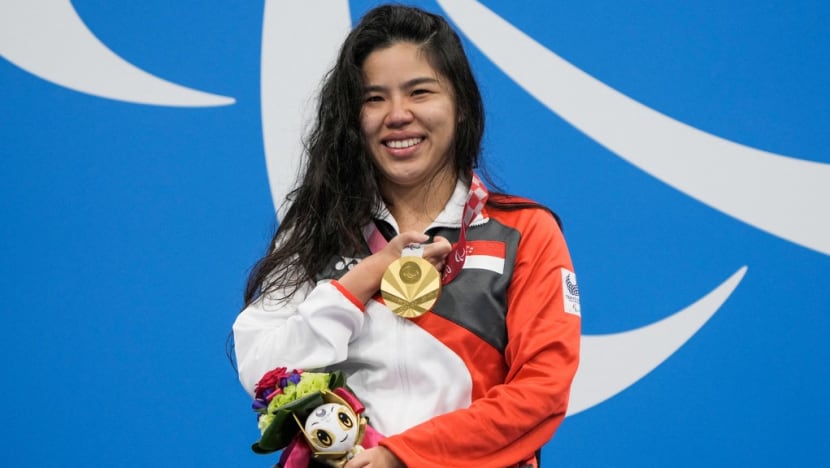
Gold medallist Singapore's Yip Pin Xiu celebrates on the podium after the women's 100m backstroke swimming event during the Tokyo 2020 Paralympic Games at the Tokyo Aquatics Centre in Tokyo on Aug 25, 2021. (Photo: Yasuyoshi CHIBA / AFP)
SINGAPORE: The year was 1988, and swimmer Thomas Yong helped to make history for Singapore.
He was part of a group of eight selected as part of the first contingent to represent the country at a Paralympic Games.
Yong, who is visually impaired, overcame many struggles to get to the event in Seoul, South Korea.
He recalls going to local swimming pools for extra training sessions and being turned away by lifeguards. Never mind that he was more than capable of taking the plunge.
“If I went alone, very often the lifeguard (would) turn me away,” Yong, who is now 67, told CNA. “They would say 'You are blind, it is very dangerous you might drown'. They would tell me it’s best if you get a partner.”
So Yong would rope in a friend.
“(Then) when I got to the swimming pool, they (would) tell me: ‘Oh you're blind. I can only allow you to swim in the learners’ pool.’ I said: ‘Ok no problem’. Then after a short while, five minutes in the learners pool, I hopped into the main pool.
“After that, when they saw me swim, they left me alone."
A world away in Seoul, Yong qualified for the finals in one of his three events - the 100m butterfly B1 - and finished in eighth place.
The achievement barely created a stir back at home, he recalled.
“When we arrived at the airport, our family members picked us up and off we went home. There wasn’t any fanfare, (it was) very low profile,” he explained.
But the competition awoke him to a world of possibilities.
“I met with so many different types of disabled people … To someone who had not seen all these competitors, disabled swimmers, it is something that is beyond a world (that one) can ever dream of,” he explained.
“It shows that we as human beings, the sky's the limit. Whatever we want to do, it can be done. Just give us the possibility and we will be able to do it.”
‘THINGS ARE CATCHING UP’
Disability sports in Singapore has progressed by leaps and bounds since Yong competed at the 1988 Games.
Behind the scenes, the Singapore Disability Sports Council (SDSC) has worked tirelessly for the cause.
The national sports body for people with disabilities, the SDSC was founded in 1973. Among other things, it provides opportunities to learn sport, and helps with the training of promising talent to represent Singapore at regional and international competitions.
Related:
At the grassroots level, a Disability Sports Master Plan was launched by the Government in 2016. Among other things, it has helped to set up centres of expertise for disability sports, with inclusive gyms introduced across the island to encourage more to pick up sports.
When it comes to elite sports, athletes such as Yip Pin Xiu, who has won multiple Paralympic Games gold medals, have become household names. Their achievements are featured in the media and their exploits celebrated and discussed in Parliament.
“I will say that it has been ‘professionalised’,” explained Yong, now a bowler with multiple medals at the ASEAN Para Games to his name.
“In my early years in the ‘70s and ‘80s, most of our coaches were on a voluntary basis, so they were not paid at all. But now it seems like things are catching on,” he said.
“When I go for training at the Temasek Club ... I have more than ample opportunity to train, not like in the early days where I had to train on my own."
“When I was younger, if you had a disability, you pretty much stayed at home and didn't do anything ... Now the conversation is shifting. And the thing is that I hope that people don't just see that people with disabilities can do sports now. It’s basically really a symbol to do whatever you want to do. Put no limits on what you want to do," Yip told CNA.
The recently concluded Tokyo 2020 Games also reignited interest in disability sports among the population, with people following the progress of Team SG's Paralympians in action.
But more can and should be done to raise the level of disability sports in Singapore, said parents, athletes, coaches and members of the sporting fraternity that CNA spoke to.
LIGHT AT THE END OF THE TUNNEL
SDSC executive director Kelly Fan suggested that sport needs to be recognised as “essential” for people with disabilities.
“We have a lot of contact with our social service agencies, members and all that. And then they tell us the same thing: ‘I cannot spare this attention to sport for my clients because I have to think about how to get them jobs first,” she explained.
“The same thing with our athletes. Their parents are telling them, their family members are telling them … go to McDonald's and work, and it is better than playing sports. Because, you go to (play) sport, you still have to spend money.”
But Yip’s parents thought differently and this freed her to pursue her love for swimming.
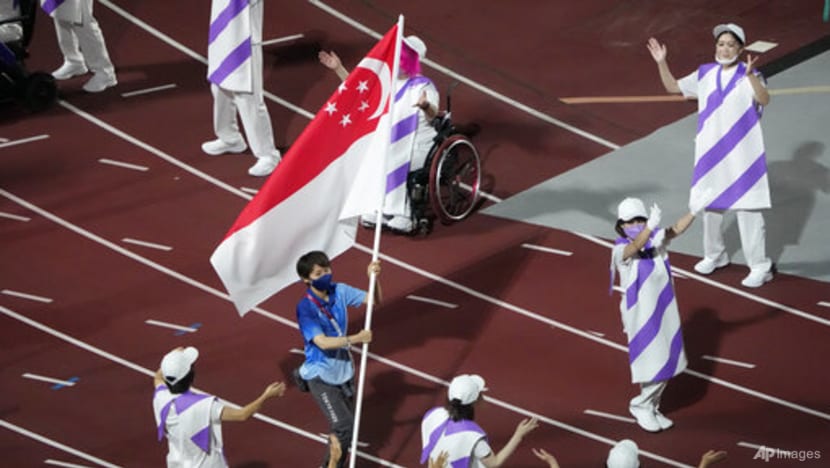
“They allowed me to be my own person at a very young age. If I wanted to put more focus on swimming instead of my studies, they would allow me to as well ... I didn't have that particular kind of stress growing up. And I know in Singapore, many people face that, so I think that was a huge part of how I managed to put sports at my forefront,” she told CNA.
“My independence naturally came with this journey.”
This open-mindedness is shared by some parents who have children with disabilities.
Take boccia player Aloysius Gan - whose living room is converted to a makeshift boccia arena every weekend as the 15-year-old hones his craft. He has been nominated to compete at the upcoming Asian Youth Para Games.
“It has given him a dream to pursue where like in a tunnel you see some light ... It has become a goal for him in his life that he wants to compete,” said Aloysius’ father, Mr Kagan Gan.
Aloysius’ dream is to one day win a Paralympic medal, explained Mr Gan, who is also his son’s ramp assistant.
In boccia, players aim to roll their game balls as close as possible to the target white ball. For Aloysius' boccia classificiation - BC3 - players are allowed to use an assistive device such as a ramp to help them play. These players make use of a ramp assistant, who sits in front of them with their back to the game, positioning the ramp and ball according to instructions.
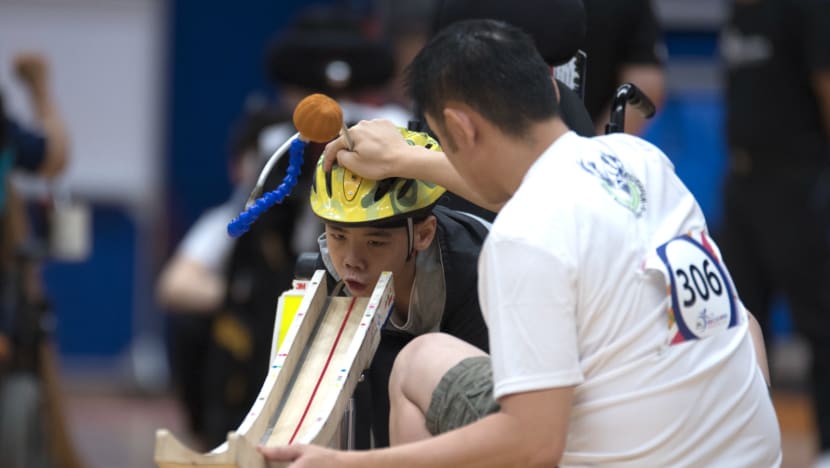
“Society’s perception cannot be changed - people measure success in different ways, maybe by your career, maybe by how much you have earned every month. To us that is always not the priority ... what we want is they do something they enjoy doing, that is more important,” he added.
“Of course, I think they need to be independent in the future but for us … We come from a perspective where … when you pursue a dream (and) put in a lot of effort, at the end of the day you really achieve your dream, that's the biggest achievement you can have in your life. That's how we look at it from a different perspective.”
Sport being a less of a priority is an issue that mainstream sports also face in Singapore, noted Yip, who has six Paralympic medals to her name.
“The main thing that we face is the same thing that able-bodied sports face, which is that sports in Singapore is not put as a priority on a lot of Singaporeans’ minds,” she explained.
“Only a few of us who are willing to put that aside, (and) at the end of the day have managed to be somewhere at the top. As an athlete, it's very difficult to be juggling schooling and training at the same time. So, if somebody can do it, or is able to, then there is a higher chance of them being at the top.”
Proponents of active participation in disability sport are keen to note the many intangible benefits that come along with participation.
Prof Teo-Koh Sock Miang, who is the president of the SDSC, noted that sports can help “transcend” disability.
“We know sports can give them a much, much richer life. Not just for the physical but the social, the emotional … For me, sport is a must have for somebody with a disability, because it is not just the sport itself, it is the total development of the individual,’ she explained.
“The sport actually enables him (Aloysius) to be more confident because sometimes as he grew up, he would compare himself to other people - other people can walk, they can run, they can do a lot of things where he couldn't,” Mr Gan added.
“There's one thing that he is quite confident that he's better than other people - which is playing boccia.”
THE NEED FOR SPONSORS
Finding sponsors and donors is a challenge that SDSC faces as it attempts to strengthen the disability sport ecosystem.
Based on its most recent annual report, about 65 per cent of SDSC’s funding for the past financial year was covered by a grant from Sport Singapore, with 15.6 per cent from sponsorships and 7.3 per cent from donors.
Funds are used for a variety of things. These include coaching and athlete training allowances, local events and competition, youth development as well as manpower.
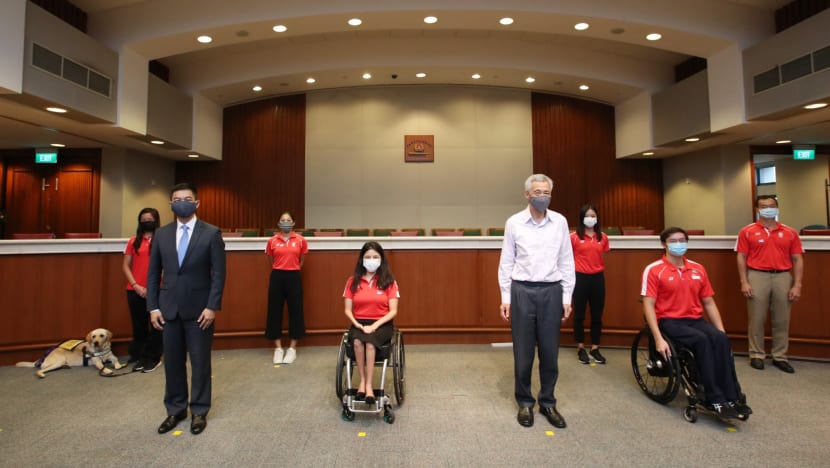
When sponsors come on board, some opt to fund a particular sport, while others fund programmes instead.
“We try to come up with different ways to try to engage our sponsors … Usually we sit down with our sponsors and find out what it is that they're comfortable with, whether they want to have an affinity with a team,” Ms Fan explained.
“They can come in with programs if they are not adopting a sport. For example, we do have corporate sponsors coming in to say that I just want to sponsor this particular program.”
One of the sponsors that has worked hand in hand with SDSC is Haw Par Corporation, which has adopted Singapore’s boccia team and supported a number SDSC initiatives since 2015. To date, it has made a cumulative contribution of S$845,000 to SDSC.
“Delivering health and wellness is an integral part of Haw Par’s business. It is our belief that no one should be constrained from leading a full and active life and sports can be a health enabler and an empowering force in people’s lives,” said Mr Wee Ee Lim, who is its president and CEO.
Given that Boccia is not as well-known as some other Paralympic sports, Mr Wee said that it was Haw Par’s hope to help to play a role in supporting Boccia athletes and the community behind them, as well as to promote public awareness.
Another corporate sponsor for SDSC is Micron Foundation, the non-profit entity of Micron Technology. It has been a partner since 2016, and involved in funding various projects and initiatives.
The company's corporate vice president and Singapore country manager, Chen Kok Sing noted that its support reflects a commitment to diversity, equality and inclusion.
"Micron has a responsibility to lead change, not only within our own walls but also in our communities. SCDC transforms the lives of persons with disabilities through sport and helps realise their potential. Our support of SCDC to promote disability sports reflects our strong commitment to DEI (diversity, equity and inclusion) in our community," said Mr Chen.
The Japanese Chamber of Commerce and Industry (JCCI) Singapore Foundation, the corporate social responsibility channel for JCCI Singapore, noted that it was "not a difficult decision" to sponsor SDSC.
"We believe that supporting disability sports will enhance the awareness and understanding of the abled people towards disability sports, hence promoting social integration of the disable people for an inclusive society," said JCCI Singapore Foundation secretary general Ryosuke Shimizu.
"Compared to mainstream sports, disability sports require greater support such as equipment, transportation, and caregiver needs, so we hope our humble contributions can help to relieve some burden in these aspects."
The process of finding a good fit between a sponsor and SDSC is not an easy one, noted Ms Fan.
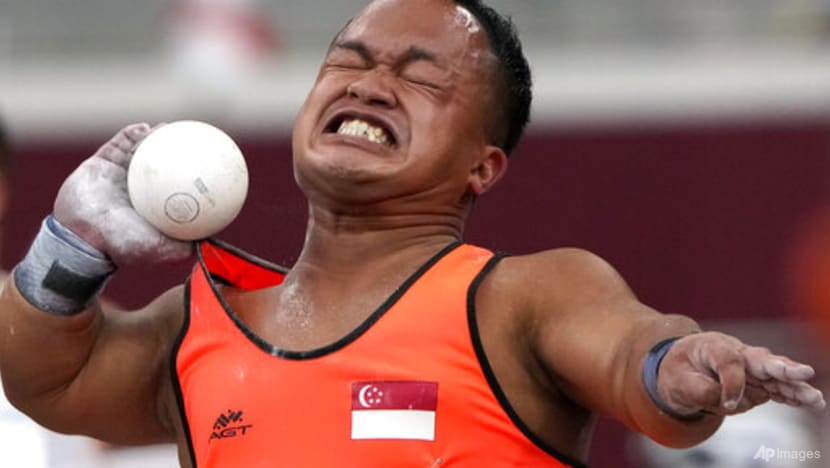
For one, employee engagement is one thing that donors look for and this is often not easy, she added.
“We've had to organise carnivals for the employees, we've had to organise talks, motivational talks for the employees. We try our best but I think at the same time we have to understand that it comes with its own set of pressures that are actually not directly related to the delivery of our programs,” she explained.
Some companies have an approach that makes longer-term collaboration difficult, she noted.
The search for sponsors is a difficulty that the Singapore National Paralympic Council (SNPC) also faces.
A charity organisation with no direct government funding, SNPC’s mandate is to select, support and prepare Singapore’s athletes for major events. It is also responsible for the Athletes Achievement Awards (AAA) given to outstanding athletes who have excelled in major games.
Speaking to CNA, Prof Teo-Koh, who is also SNPC president, noted that it has been “fortunate” to have the support of sponsors such as the Tote Board.
“SNPC has to raise the difference that the Tote Board does not support, and so we are quite deliberate about having to go out and work with our donors and sponsors to make sure that we can truly fund the team 100 per cent when they're out there participating on behalf of Singapore.”
In addition, there is also the help from worldwide Paralympic partners such as Bridgestone and Toyota, she noted. However, such support is not guaranteed as it depends on factors including whether such companies have a presence in Singapore, noted Prof Teo-Koh.
Given that there are many social service agencies in Singapore, some companies are already supporting other causes, she noted.
“For some of the corporates, when we approach (them) they basically say: ‘Look, we are already supporting quite a number.’ So I appreciate that, and I am grateful, and I thank them that as long as you are also doing your part in Singapore, supporting other worthy causes, that's okay,” she said.
Because Singapore is a small market, Prof Teo-Koh noted that it is “quite challenging” for companies to see the value in athletes promoting their brands and products.
“If you are talking about branding, about products, it's quite challenging. It's not that easy, so I think we need to recognise that difference in terms of demographics. And also culture - sporting culture,” she said.
Former Olympian Mark Chay noted that the traditional method of sponsorship - putting logos on jerseys will not be able to work - if companies are only looking for brand awareness.
Instead, companies can learn from the values exemplified by athletes, and see athletes as opportunities by which they can upgrade their own workforce - whether it be by hiring them, or through communication opportunities like motivational talks, he said.
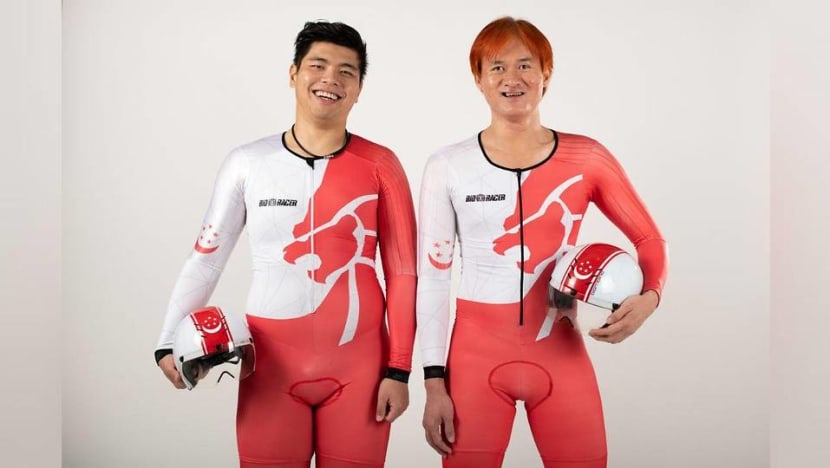
This sentiment was echoed by Ang Kee Meng, who is the able-bodied pilot for cyclist Steve Tee. Ang and Tee competed in Tokyo, earning themselves two personal bests in two events.
“Especially in Singapore, corporate sponsors don't see the ROI (return of investment) because … in Singapore the sporting sponsorship culture is not there,” he noted.
“Our culture is such that it is very merit based. So you need to have some merit before people actually start to recognise you. Even going to a major Games like (the) Olympics and Paralympics, people might just see: ‘Oh these are guys just participating’. But to actually podium is another different ball game.”
However, Ang is hopeful that this will change after Tokyo 2020.
“The main reason is that they can't commit because it's hard for them to see an ROI or another thing is that there's too little traction in para sport this and that. But I think with Tokyo and with COVID-19 because people can’t travel, they are all glued to screens,” he explained.
“It's a good thing because that's how the Tokyo Olympics coverage was so good that a lot of people actually knew that Singapore para sport is out there and doing greatness. So I think it's a good leverage for me to talk to the sponsors as well.”
THE PUSH FOR EQUALITY
The integration of disability sports into mainstream National Sports Associations (NSAs) is another move that SDSC is looking towards in the future.
As of today, two NSAs - Fencing Singapore and the Equestrian Federation of Singapore - are members of SDSC and have committed to include disability sports in their programme, noted Ms Fan.
“Right now, you can see the NSAs actually evolving, saying that they are becoming more educated, and saying that integration is something that they are willing to consider,” she said.
“It still takes time for the system to change, but we look at it as a long term plan that also shows that Singapore is improving, is evolving.”
At the same time, this must be a process that is initiated carefully, she noted.
This integration is a move that Yip has championed as well. However, she too urged caution.
“It is not as simple as it seems, because at the end of the day, of course, there is the dream scenario where they take in disability sports and they treat disability sports how they treat all the other sports under their arm. That is the dream scenario, but I think it is important that they are guided initially so that we … protect disability sports’ interests,” she said.
“Eventually when we know that they are ready, that they are willing and they see an importance in it, then they can fully take it on. They must be capable and they must be willing ...They need to also want to do it, and we hope that this day comes sooner rather than later.”
Discussions over equality between have also been all over the online sphere in recent times - in particular the disparity between the cash rewards of the Major Games Award Programme (MAP) for able-bodied athletes and the AAA for para-athletes.
Speaking in Parliament earlier this week, Minister for Culture, Community and Youth Edwin Tong revealed that efforts are being made to raise the cash rewards for para-athletes in major games.
Mr Tong explained that since the inception of MAP and AAA, the awards have been funded entirely by private sponsors. The difference in cash prizes does not reflect how the Government values able-bodied athletes and para-athletes, he stressed.
While Prof Teo-Koh declined to elaborate on what the new cash prize amount might be, she noted that an announcement would be made later this month at Yip’s AAA prize presentation.
Prof Teo-Koh stressed that it was important for the public to understand that the AAA is a package rather than a one-off award. This means having to go to donors and sponsors and getting them to accept it in its entirety.
Currently, the cash payout is for athletes who contribute to Singapore’s gold, silver or bronze medal tally not just at the Paralympic Games, but also Asian Para Games and the Commonwealth Games, as well as those who win a gold medal in the ASEAN Para Games.
“We need a donor to say: 'I will accept the entire package'. And you don't accept it only for one year, you have to minimally take it through an entire what we call a Paralympic cycle of four years,” she explained.
So the challenge … number one, is first that they are willing to commit, and then willing to commit is commit to minimally one cycle, at least, and then commit to the entire scheme.”
Prof Teo-Koh also noted that there could plans to put out an open call for contributions in the future in support of the AAA.
She hopes that the public will put their support into action.
“Either help us raise funds, (or) if you know of corporates, if you have relationships with corporates, if you know somebody who has got money they want to donate, do help us do the work, take action,” she noted.
“If you are working in a multinational or in a corporate company in Singapore, talk to your board to support us.”
Apart from sponsorships, Yip also noted the need of having a good system and administrators in place to ensure that talent is properly cultivated.
“I've heard people saying that they wanted to join competitive sports, they put in their application but somehow their application is lost somewhere in the mail, and then years down the road and they are scouted by someone. And then they join but you see there are so many missing years before that,” she said.
“I think we do need funding for more administrators also. Because (at the) end of the day … there is so little talent. It's important to be able to go out and find more.”
More than merely setting up programmes, there is a need for mentors and surrounding athletes with “the right people”, she noted.
“It’s (about) finding people and surrounding them with the right people, because you can find the people but if they don't want to stay, then there's no point. But if you give them a good mentor, you lead them in the right way, then there's a higher chance that they will still be around in the long run,” she added.
Ultimately, for disability sports to reach the next level, more awareness is required, said those who CNA spoke to.
And the Tokyo 2020 Games has provided that platform to ignite the spark.
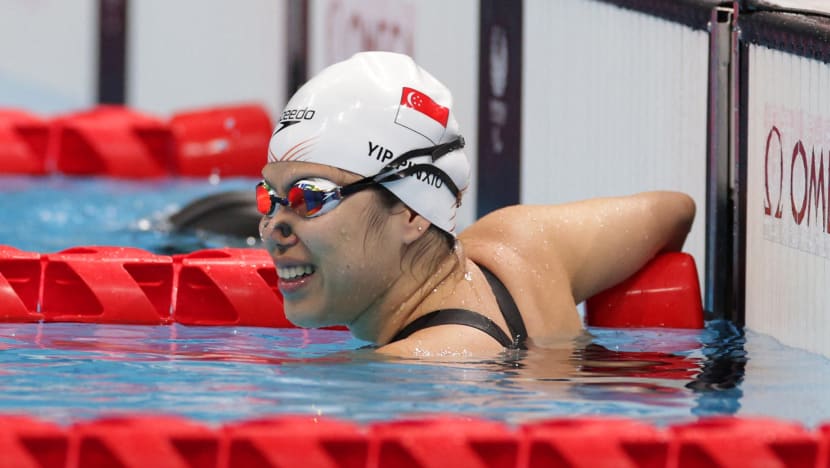
“Currently, there is momentum. And we do need to ride on the momentum while people still see significance in it, see something in it. It is always a good time to start, but with the momentum then there will be greater impact,” said Yip.
Yip's coach Chay agreed, pointing out that there is "a great opportunity" now to ride the wave of interest.
A confluence of different factors, including Tokyo having a time zone close to Singapore, the broadcasting of the Games on television and the achievements of Yip has helped to further stoke the interest, he added,
"I'm hoping that (the) private sector, the general public is able to reach into their pocket and say: 'You know what, we believe in this, we believe that these people in our society, PWDs (persons with disabilities) should be given opportunities to excel and succeed. And in order to do this, we need funding and I'm willing to put in 'X' amount of money to donate, to sponsor," said Mr Chay, who competed at the 2000 Sydney Olympics.
Ms Fan agreed that the broadcasting of this year’s edition of the Paralympics provides a platform to build on for disability sports.
“Through the broadcast, I believe it has helped a lot in this year's campaign to help people understand that they can actually watch, they're able to see for themselves what para sports looks like and how it is being supported around the world,” she noted.
“I think slowly we are moving forward. I'm very happy that the previous Paralympic Games was telecast on TV, so people got to watch more of it. And people know (which) sport Singapore is being represented in - not just, swimming (or) just the main sports,” said powerlifter Nur Aini Mohamad Yasli.
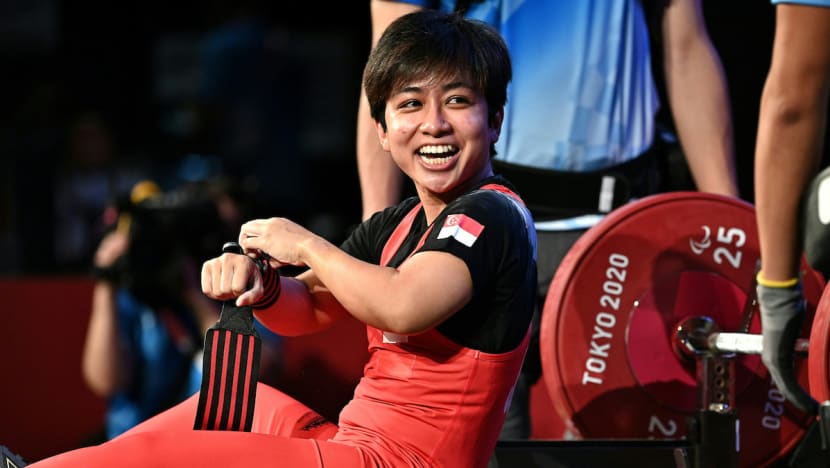
“When able-bodied people see those para athletes doing the things that able-bodied people can do, the mindset just shifts.”
Exposure to disability sports provides better understanding for the public, noted Aini.
“The understanding of disability also goes back to the exposure, how people can know about the different disabilities. For powerlifting, we are training at the public gym at Toa Payoh … So I think that is good, because we are in a public setting so the public can see us. So they know that, oh, Singapore, has a powerlifting sport,” she explained.
Another way is for disability sports to feature in a few mainstream Physical Education lessons, suggested Mr Chay. A possible option could be to allow students to interact with such athletes to find out more about them, he said.
"This is a problem with our school system because we don't introduce kids early enough to people with disabilities to understand how to treat them," he added.
Apart from educating the public, the Games have reminded younger athletes of the role models who have gone before them.
This is the case for swimmer Nicole Fu, who is autistic.
“It inspires her to want to be there as well. When she watched Pin Xiu fly the Singapore flag, receiving her medals, her eyes were glued on the TV. And she was standing up, she was so proud," said her mother Ms Ferrin Fu. “She was saying: ‘Yes Singapore!’”
What she saw in Tokyo has persuaded Nicole, 21, to continue competing after previously deciding to stop within the next few years, said her mother.
“For autistic children, it is very difficult to change things because they have a schedule,” said Ms Fu.
But having watched Team SG in action in Tokyo, Nicole has made a change. Now she plans to retire at the end of 2024. After the Paris Paralympics.
Said her mother: “She definitely wants to be able to be there - that's for sure.”

















